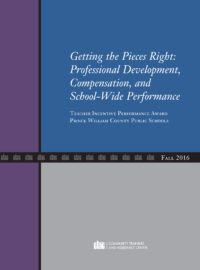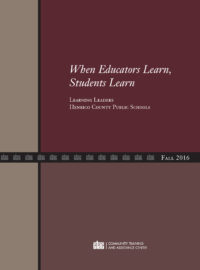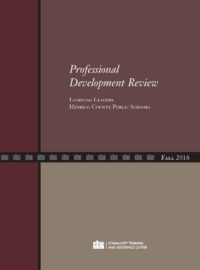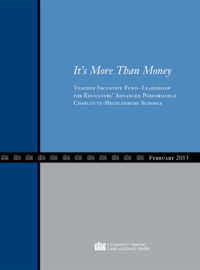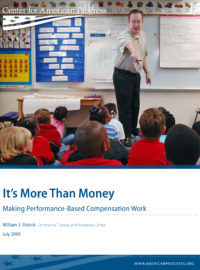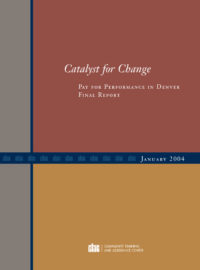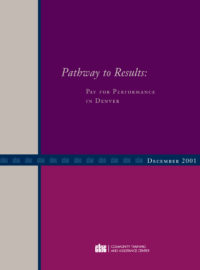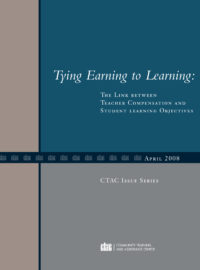Publications and Reports
CTAC’s reports focus on cutting edge issues in education and community development. Our research and evaluation studies inform practice and guide policy decision-making at local, state and national levels.
Getting the Pieces Right: Professional Development, Compensation, and School-Wide Performance
Getting the Pieces Right is the study of the Teacher Incentive Performance Award (TIPA) initiative in Virginia’s Prince William County Public Schools. A $10.9 million, five-year program supported by the U.S. Department of Education’s Teacher Incentive Fund, TIPA sought to increase student achievement in PWCS’s 30 lowest performing schools by focusing intensively on instructional improvement.
Findings show that TIPA led to statistically significant increases in student achievement in all four core subjects analyzed as measured by Virginia Standards of Learning (SOL) test results. TIPA’s processes greatly increased collaboration and instructional dialogue among principals and teachers and strengthened the use of data to inform instruction.
This five-year study describes how TIPA provided incentives that fostered collaborative school-wide improvement efforts. The initiative provided “real time,” tailored professional development to teachers and customized leadership development to the 30 TIPA principals. It implemented a performance-based compensation system combining student growth and achievement measures with 23 measures of school effectiveness, such as positive school culture, effective parent engagement, and teacher leadership. And it awarded school-based compensation bonuses, with administrators/teachers in core subjects eligible for the largest awards.
When Educators Learn, Students Learn
When Educators Learn, Students Learn is the final evaluation of the Learning Leaders initiative in Virginia’s Henrico County Public Schools. A $16.5 million, five-year program supported by the U.S. Department of Education’s Teacher Incentive Fund, Learning Leaders sought to increase student achievement in eight of Henrico’s lowest performing schools by focusing intensively on instructional improvement.
Findings show that average scores on the Virginia Standards of Learning (SOL) state tests increased in Learning Leaders schools in all four core subjects analyzed. The gains were statistically significant in science and history. The opposite occurred in comparison schools where scores in all four subjects declined. The initiative’s processes greatly increased instructional feedback and reflection, collaborative dialogue among principals and teachers, and the use of data to inform instruction. Both individual educators and entire schools became more effective.
The five-year study describes how Learning Leaders implemented explicit student growth target setting as well as teacher observations that focused on areas of classroom practice with highest payoff for student learning; provided tailored professional development for teachers and administrators—trainings and workshops as well as one-to-one coaching—based on needs revealed by analysis of student data and teacher observations; and implemented a performance-based compensation system that rewarded individual educators.
Professional Development Review: Learning Leaders
This review examines the professional development (PD) approach designed specifically for the eight Henrico County schools participating in the Learning Leaders initiative. Its two components were: the PD Academy—the vehicle for providing formal trainings and professional development workshops for all Learning Leaders educators; and on-the-job coaching, which provided teachers and administrators with informal professional development. Findings show that the Learning Leaders PD approach in general, and its school-based instructional coaching model in particular, were successful in meeting the district’s instructional improvement objectives for Learning Leaders. The data suggest that the PD approach effectively built teachers’ capacity to set, analyze, and interpret ambitious individual student learning targets that contributed to enhanced achievement. It also promoted a collaborative and “safe” school culture where teachers readily shared their instructional approaches and challenges with their colleagues in the interest of enhancing overall student learning gains.
It’s More Than Money: Teacher Incentive Fund–Leadership for Educators’ Advanced Performance, Charlotte-Mecklenburg Schools
It’s More Than Money is the final evaluation of a comprehensive, performance-based system initiative in the Charlotte-Mecklenburg Schools. CTAC’s evaluation demonstrates that high-quality Student Learning Objectives (SLOs) contribute to improving teaching and bolstering student growth. Findings show statistically significant multi-year improvements in growth rates for students of teachers with SLOs compared to those in peer schools without SLOs: 12% greater growth on average in math and 13% greater growth on average in reading.
This five-year study examines the genesis, development, and implementation of the SLO approach together with the incorporation of a value-added measure approach. It provides a study in the opportunities, complexities, benefits, and challenges that arise in measuring and compensating the impact of teacher effectiveness on student growth. It is a chronicle that draws one into the promise of performance-based compensation and a cautionary tale that alerts any district starting down this path that significantly more is at stake than money alone.
It’s More Than Money: Making Performance-Based Compensation Work
The lesson of performance-based compensation is one of institutional change. Gaps between the goals of compensation policy and practice on the one hand, and organizational results on the other, have characteristically come from under-conceptualizing what is involved in performance-based compensation. The impact of performance-based compensation comes from anticipating the consequences of the reform for the entire district. As this CTAC report shows, performance-based compensation involves more than recognizing excellence in teaching; it should expand the system’s overall capacity to support classrooms and improve teaching quality. An effective and sustainable strategy for recruiting, retaining, and rewarding excellence in teaching will provide a fertile ground where teaching thrives as a profession and is nurtured at a greater level of excellence and scale. This report was commissioned by the Center for American Progress.
Catalyst for Change: Pay for Performance in Denver Final Report
Catalyst for Change is the final summative report for the Denver Pay-for-Performance initiative that focused on developing a link between student achievement and teacher compensation, and launched a national movement in performance-based reform. This CTAC evaluation is a groundbreaking longitudinal study of impact of performance-based compensation on student achievement, teacher effectiveness, and systemic change. This study found that students whose teachers crafted high quality SLOs outperformed their peers and showed significantly greater gain on two independent measures of student achievement at all three school levels during all years under study. This study provided the research and evaluation base for Congressional approval of the Teacher Incentive Fund.
Pathway to Results: Pay for Performance in Denver
This report presents findings based on the halfway point of the performance-based compensation pilot in the Denver Public Schools. At the mid-point of this program, the initiative was very much in the critical phase of seeking to fully and fairly test the powerful concept—is performance-based compensation a viable and effective strategy for the Board of Education and the Teachers’ Association to use to accomplish their goals? This report contains CTAC’s analyses, findings, and recommendations, and provides the necessary foundation for the mid-course adjustments made to the initiative.
Tying Earning to Learning: The Link Between Teacher Compensation and Student Learning Objectives
Student Learning Objectives (SLOs) have the potential to positively impact the performance of teachers and their students. Based on CTAC’s research and national best practices, this primer analyzes the importance of SLOs and provides a step-by-step guide for successfully designing and implementing SLOs as part of compensation reform.

